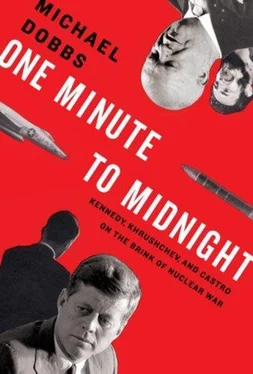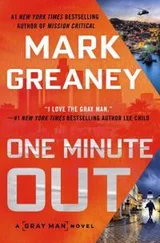The Senate’s intellectual oracle, former Rhodes Scholar William Fulbright, spoke up in support of his fellow Southern Democrat. He had opposed the Bay of Pigs adventure, but now wanted an “all-out” invasion of Cuba “as quickly as possible.”
The criticism from his former colleagues stung the president. “If they want this job, fuck ’em,” he exploded, his eyes flashing with anger, as he went up to the residence to prepare for the television address. “They can have it. It’s no great joy to me.”
6:00 P.M. MONDAY, OCTOBER 22 (1:00 A.M. TUESDAY, MOSCOW)
Anatoly Dobrynin, the Soviet ambassador to the United States, was summoned to the State Department at 6:00 p.m. He knew nothing about the missiles on Cuba, having been kept in the dark by his own government. His normally jovial face went ashen as the secretary of state handed him a copy of the president’s speech and a private warning to Khrushchev not to underestimate American “will and determination.” Dean Rusk thought that the envoy seemed to age “ten years” in the few minutes he spoke with him. To Dobrynin, Rusk himself was “clearly in a nervous and agitated mood although he tried to conceal it.”
“Is this a crisis?” the reporters yelled, as Dobrynin emerged from the State Department clutching a large manila envelope.
“What do you think?” the ambassador replied grimly. He waved the envelope at the reporters as he got into his black Chrysler limousine.
Seven time zones away in Moscow, Richard Davies, the political counselor at the U.S. Embassy, delivered identical documents to the Soviet Foreign Ministry. They were in Khrushchev’s hands fifteen minutes later. The news was not as bad as he feared. The president was demanding the withdrawal of Soviet missiles from Cuba, but had not set a deadline. “This is not a war against Cuba, but some kind of ultimatum,” was Khrushchev’s immediate reaction.
His mood, always changeable, now shifted from despair to relief. “We’ve saved Cuba,” he announced ebulliently.
Kennedy’s decision to impose a naval blockade effectively halted the supply of Soviet military equipment to Cuba. Khrushchev was pleased to learn that the three R-12 medium-range missile regiments had already reached the island, along with most of their gear. Only one of the eighteen ships used to transport the regiments was still at sea. The 11,000-ton Yuri Gagarin, loaded with missile fueling equipment, was approaching the Bahamas, two days’ sailing time from Havana. Most of the headquarters staff for one of the R-12 regiments were also on board.
The two R-14 regiments were a different matter. Fourteen ships had been chartered to transport the bigger intermediate-range missiles, which were capable of hitting targets throughout the United States, along with the troops and associated paraphernalia. Only one of these ships had made it safely to Cuba. Two more were less than a day’s sailing time away. One was a passenger ship, the Nikolaevsk, with more than two thousand soldiers aboard. The other, the Divnogorsk, was a small Polish-built tanker. The rockets themselves were still in the middle of the Atlantic.
Most worrying of all to Khrushchev was the Aleksandrovsk, a 5,400-ton freighter crammed with nuclear warheads. Her cargo included twenty-four 1-megaton warheads for the R-14 missile, each one of which contained the destructive force of seventy Hiroshima-type atomic bombs. The explosive power concentrated on board the ship exceeded all the bombs dropped in the history of warfare by a factor of at least three.
After a sixteen-day voyage from the port of Severomorsk, high above the Arctic Circle, the Aleksandrovsk was approaching the northern coast of Cuba. The ship was still in international waters, nearly half a day’s sailing time from the closest Cuban port. She was obviously a prime target for interception by the U.S. Navy. Nuclear-armed submarines had escorted the Aleksandrovsk part of the way across the Atlantic, but she was now practically defenseless, accompanied only by another Soviet freighter, the Almetyevsk. If the Americans tried to board, the captain had orders to open fire with automatic weapons, blow up his ship, and send the equivalent of 25 million tons of TNT to the bottom of the sea. The Aleksandrovsk must not be permitted to fall into enemy hands.
In addition to the surface ships, there were also four Soviet submarines out in the western Atlantic. Khrushchev had initially planned to build a modern submarine base in Cuba, but had scaled these plans back in late September. Instead of nuclear-powered submarines, which were capable of remaining under the ocean for weeks at a time, he dispatched four Foxtrot-class diesel-electric submarines. The Foxtrots were larger, updated versions of the German U-boats that had harassed Allied shipping in World War II. The difference was that they each carried a small nuclear-tipped torpedo, in addition to twenty-one conventional torpedoes.
Recovering from his initial shock, Khrushchev began making a series of rapid decisions. He ordered a heightening of alert levels for Soviet military units. He dictated letters to Kennedy and Castro. He drafted a statement denouncing the blockade as “an act of piracy” and accusing the United States of pushing the world to the edge of “thermonuclear war.” But his anger was tempered with caution. To reduce the risk of a confrontation with American warships, he ordered the return of most of the Soviet vessels that had not reached Cuban waters. The recalled ships included the wide-hatch freighters Kimovsk and Poltava, both loaded with R-14 missiles, and the Yuri Gagarin, with equipment for one of the R-12 regiments. Ships with nonmilitary cargoes, such as the oil tanker Bucharest, were authorized to proceed to Cuba. The vessels closest to Cuba, including the warhead-carrying Aleksandrovsk, were instructed to head for the nearest port.
After earlier considering the idea of authorizing Soviet commanders on Cuba to use tactical nuclear weapons in response to a U.S. invasion, Khrushchev now rejected this option. He also decided against transferring control of Soviet weaponry to the Cubans or announcing a formal defense treaty with Cuba. Instead, he dictated an order to the commander in chief of the Soviet Group of Forces, General Issa Pliyev:
In connection with the possible landing on Cuba by Americans taking part in exercises in the Caribbean sea, take urgent measures to increase combat readiness and defeat the enemy, through the joint efforts of the Cuban army and all Soviet troop units, excluding the weapons of STATSENKO and all the cargoes of BELOBORODOV.
Major General Igor Statsenko was the commander of the Soviet missile troops on Cuba; Colonel Nikolai Beloborodov had responsibility for the nuclear warheads. Decoded, the message meant that Soviet troops on Cuba had orders to resist an American invasion, but were not authorized to use nuclear weapons of any kind. Khrushchev was determined to maintain personal control over the warheads.
Kremlin notetakers struggled to keep pace with a jumble of thoughts and instructions from the first secretary:
Order the return of the ships (those ships that have not yet arrived).
(Everybody says this is the correct decision.)
Issue a Soviet government statement—a protest.
The USA is on a course for preparing and unleashing the third world war.
American imperialism is trying to dictate its will to everybody else.
We protest. All countries have the right to defend themselves and to conclude alliances.
The USSR is also armed, we protest these piratic actions….
Let the four submarines continue. The Aleksandrovsk should go to the nearest port.
Читать дальше












